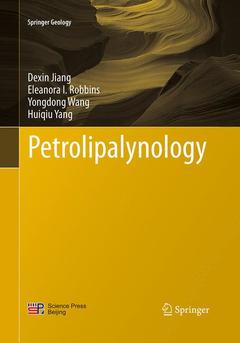Description
Petrolipalynology, 1st ed. 2016
Springer Geology Series
Language: English
Subjects for Petrolipalynology:
Publication date: 08-2016
Support: Print on demand
Publication date: 10-2015
Support: Print on demand
Description
/li>Contents
/li>Biography
/li>Comment
/li>
Jiang Dexin, Professor, born in 1933 in Zhejiang of China and graduated from Beijing College of Geology in China (now the China University of Geosciences, Beijing) in 1956. Affiliation: Lanzhou Center for Oil and Gas Resources, Institute of Geology and Geophysics, Chinese Academy of Sciences (formerly the Lanzhou Institute of Geology, Chinese Academy of Sciences). Her major study areas include: terrestrial oil and gas reservoir formation and distribution in NW China, the formation of petroleum, identification of source rocks and mechanisms of petroleum migration. In particular, she has focused on petroleum source rocks based on palynological studies. More than 70 papers have been published in international and Chinese journals. As a visiting scholar of Chinese Academy of Sciences, she cooperated with Dr. Alfred Traverse at the Palynological Laboratory of the Pennsylvania State University in 1984. Her scientific publications on sporo-pollen in crude oils and petroleum source rocks were awarded the Scientific Technical Progress Prize in 1986 and the Nature Science Prize in 1992 by the Chinese Academy of Sciences.
Eleanora I. Robbins, Ph.D., is a paleopalynologist, having 34 years of experience as an economic geologist and palynologist with the U.S. Geological Survey in Reston, Virginia, working on mineral deposits, petroleum, and coal. Born in 1942 in Washington, DC, she is presently adjunct faculty at San Diego State University in San Die
go, California. She also worked for the Geological Survey of Tanzania, exploring for mineral deposits. Her specialties include Precambrian, Triassic, and Cretaceous palynology. She has also published extensively in geomicrobiology, focusing on coal and metal mine remediation.Yongdong Wang, Ph.D., Professor of palaeontology in Nanjing Institute of Geology and Palaeontology, Chinese Academy of Sciences. Born in 1967 in Gansu of China, he obtained bachelors and masters degrees in Lanzhou Universi




